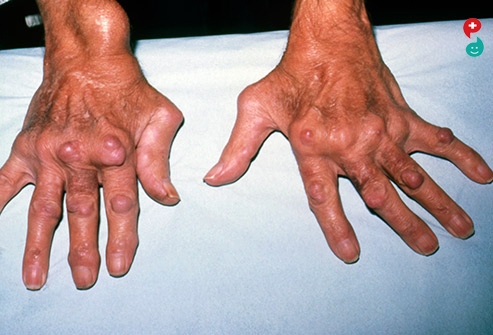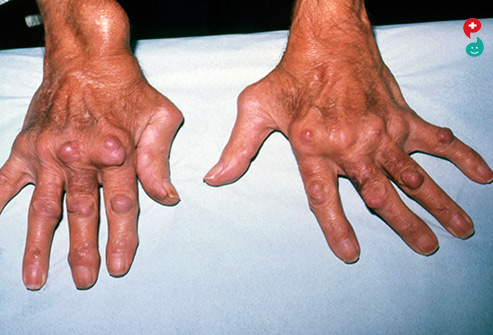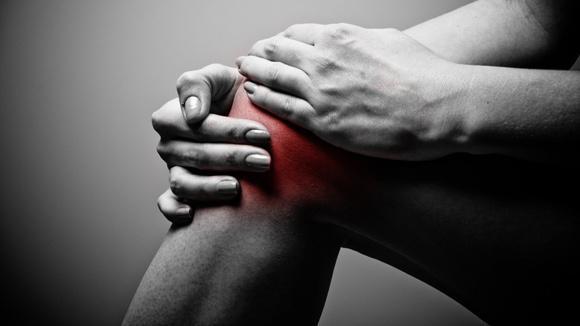What’s rheumatoid arthritis?
Rheumatoid arthritis (RA) is an autoimmune disease that can cause joint pain and damage throughout your body. The joint damage that RA causes usually happens on both sides of your body. So if a joint is affected in one of your arms or legs, the same joint in the other arm or leg will probably be affected, too. This is one way that doctors distinguish RA from other forms of arthritis, such as osteoarthritis (OA).
Treatments work best when RA is diagnosed early, so it’s important to learn the signs. Read on to learn everything you want to know about RA, from types and symptoms, to home remedies, diets, and other treatments.
Rheumatoid arthritis symptoms
RA is a long-term or chronic disease marked by symptoms of inflammation and pain in the joints. These symptoms and signs occur during periods known as flares. Other times are known as periods of remission — this is when symptoms dissipate completely.
RA symptoms, which can occur throughout the body, include:
joint pain
joint swelling
joint stiffness
loss of joint function
Symptoms can vary from mild to severe. It’s important not to ignore your symptoms, even if they come and go. Knowing the early signs of RA will help you and your doctor to better treat it.
Rheumatoid arthritis diagnosis
Diagnosing RA can take time and may require multiple lab tests to confirm clinical examination findings. Your doctor will use several tools to diagnose RA.
First your doctor will ask about your symptoms and medical history. They’ll also perform a physical exam of your joints. This will include looking for swelling and redness, and testing your reflexes and muscle strength. Your doctor will also touch the affected joints to check for warmth and tenderness. If they suspect RA, they’ll most likely refer you to a specialist called a rheumatologist.
Since no single test can confirm a diagnosis of RA, your doctor or rheumatologist may use several different types of tests. They may test your blood for certain substances like antibodies, or check the level of certain substances like acute phase reactants that are elevated during inflammatory conditions. These can be a sign of RA and help support the diagnosis.
They may also request certain imaging tests. Tests such as ultrasonography, x-ray exams, and magnetic resonance imaging (MRI) not only show if damage from RA has been done to your joints but also how severe the damage is. A complete evaluation and monitoring of other organ systems might be in order for some people with RA, too. Learn more about the process of diagnosing RA.
Blood test for rheumatoid arthritis
There are several types of blood tests that help your doctor or rheumatologist determine whether you have RA. These tests include:
Rheumatoid factor test: This blood test checks for a protein called rheumatoid factor. High levels of rheumatoid factor are associated with autoimmune diseases, especially RA.
Anticitrullinated protein antibody test (anti-CCP):This test looks for an antibody that’s associated with RA. People who have this antibody usually have the disease. However, not everyone with RA tests positive for this antibody.
Antinuclear antibody test: This tests your immune system to see if it’s producing antibodies. Your body may make antibodies as a response to many different types of conditions, including RA.
Erythrocyte sedimentation rate: This test helps determine the degree of inflammation in your body. The result tells your doctor whether inflammation is present. However, it doesn’t indicate the cause of the inflammation.
C-reactive protein test: A severe infection or significant inflammation anywhere in your body can trigger your liver to make C-reactive protein. High levels of this inflammatory marker are associated with RA.
Find out more about the different RA blood tests.
Rheumatoid arthritis treatment
There’s no cure for RA, but there are treatments that can help you to manage it. Treatments for RA help to manage the pain and control the inflammatory response which can in many cases result in remission. Decreasing the inflammation can also help to prevent further joint and organ damage.
Treatments may include:
medications
alternative or home remedies
dietary changes
specific types of exercise
Your doctor will work with you to determine the best types of treatments for you. For many people, these treatments can help them live an active life and reduce the risk of long-term complications. Learn more about specific RA treatments and how to treat flares.
Rheumatoid arthritis medications
There are many types of medication for RA. Some of these medications help to reduce the pain and inflammation of RA. Some help to reduce flares and limit the damage that RA does to your joints.
The following medications help reduce the pain and inflammation during RA flares:
nonsteroidal anti-inflammatory drugs (NSAIDs)
corticosteroids
acetaminophen
The following drugs work to slow the damage that RA can cause to your body:
Disease-modifying antirheumatic drugs (DMARDs): DMARDs work by blocking your body’s immune system response. This helps to slow down RA’s progression.
Biologics: These new generation DMARDs provide a targetedresponse to inflammation rather than blocking your body’s entire immune system response. They may be an effective treatment for people who don’t respond to treatment with more traditional DMARDs.
Janus kinase (JAK) inhibitors: These are a new subcategory of DMARDs that block certain immune responses. These are drugs that your doctor may use to help prevent inflammation and stop damage to your joints when DMARDs and biologics don’t work for you.
What is arthritis?
Arthritis is an inflammation of the joints. It can affect one joint or multiple joints. There are more than 100 different types of arthritis, with different causes and treatment methods. Two of the most common types are osteoarthritis (OA) and rheumatoid arthritis (RA). The symptoms of arthritis usually develop over time, but they may also appear suddenly. Arthritis is most commonly seen in adults over the age of 65, but it can also develop in children, teens, and younger adults. Arthritis is more common in women than men and in people who are overweight.
What are the symptoms of arthritis?
Joint pain, stiffness, and swelling are the most common symptoms of arthritis. Your range of motion may also decrease, and you may experience redness of the skin around the joint. Many people with arthritis notice their symptoms are worse in the morning.
In the case of RA, you may feel tired or experience a loss of appetite due to the inflammation the immune system’s activity causes. You may also become anemic — meaning your red blood cell count decreases — or have a slight fever. Severe RA can cause joint deformity if left untreated.
What causes arthritis?
Cartilage is a firm but flexible connective tissue in your joints. It protects the joints by absorbing the pressure and shock created when you move and put stress on them. A reduction in the normal amount of this cartilage tissue cause some forms of arthritis.
Normal wear and tear causes OA, one of the most common forms of arthritis. An infection or injury to the joints can exacerbate this natural breakdown of cartilage tissue. Your risk of developing OA may be higher if you have a family history of the disease.
Another common form of arthritis, RA, is an Auto immune disorder. It occurs when your body’s immune system attacks the tissues of the body. These attacks affect the synovium, a soft tissue in your joints that produces a fluid that nourishes the cartilage and lubricates the joints.
RA is a disease of the synovium that will invade and destroy a joint. It can eventually lead to the destruction of both bone and cartilage inside the joint. The exact cause of the immune system’s attacks is unknown. But scientists have discovered genetic markers that increase your risk of developing RA five fold.
How is arthritis treated?
The main goal of treatment is to reduce the amount of pain you’re experiencing and prevent additional damage to the joints. You’ll learn what works best for you in terms of controlling pain. Some people find to be soothing. Others use mobility assistance devices, like canes or walkers, to help take pressure off sore joints. Improving your joint function is also important. Your doctor may prescribe you a combination of treatment methods to achieve the best results.
Here are 5 natural ways to ease arthritis pain, according to the Arthritis Foundation:
- Massage :- Massages have been shown to reduce joint pain and #JointStiffness as well as a range of motions. But the Arthritis Foundation warns to listen to your body and perhaps avoid getting a massage when joints are especially tender and sensitive.
- * Eat plenty of fish: Certain types of fish -- salmon, tuna, mackerel and herring, are full of inflammation-fighting #Omega-3 fatty acids, and for that reason, experts recommend you eat at least 3-4 ounces of fish twice a week.
- Weight loss: Losing 1 pound removes 4 pounds of pressure on swollen, painful joints. You can maintain a healthy weight by combining a #BalancedDiet with regular physical activity.
- Tai Chi : A Chinese practice of gentle flowing movements, deep breathing and #meditation, and has been shown to not only reduce joint pain, but also improve range of motion and function.
- Acupuncture: A form of Chinese medicine which involves inserting thin needles at specific points on the body is designed to stimulate nerves, muscles and connective tissue. Many experts recommend acupuncture to heal arthritis pain.











